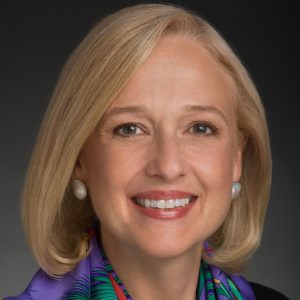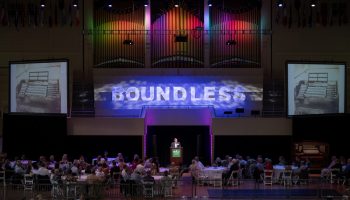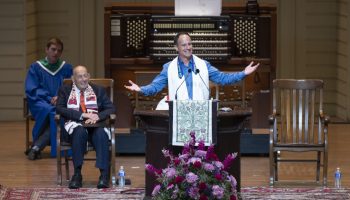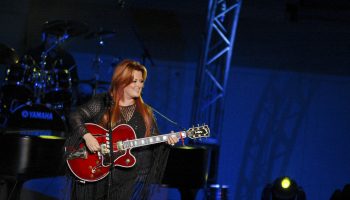
Lin-Manuel Miranda ended his esteemed musical Hamilton with “Who lives, Who dies, Who tells your story?” For Paula Kerger, that series of questions is where her newest story begins.
“I love Hamilton just as much as the next person, because I think it shows us that the importance of authentic media is to pay attention to not only the stories themselves, but the people who have lived those stories,” Kerger said. “If we ever want to get to a place of having an understanding of one another, we need to start listening more — a lot more.”
Kerger, president and chief executive officer of PBS, will speak about “American Portrait” in conversation with Chautauqua Institution President Michael E. Hill at 10:45 a.m. EDT Thursday, July 16, on CHQ Assembly’s Video Platform with a lecture on the Week Three theme, “Art and Democracy.”
“American Portrait” is a national storytelling initiative aimed to define what it means to be an American. To accomplish that, PBS and its partners have gathered photo, video and text submissions from an array of Americans across the nation. The effort also includes stories from PBS Digital Studios that will stream as a companion miniseries, a documentary series inspired by user submissions, live event experiences and educational materials for classrooms across the country. Last off-season, Chautauquans who attended the Winter Village were among the first to engage in this project, with PBS representatives on the grounds to encourage community members to record their own stories.
“‘American Portrait’ was envisioned as being an opportunity, post-election, to get a snapshot of America by getting people to talk about their own individual experiences,” Kerger said. “We proposed questions such as, ‘When I leave my house I feel …’ and, ‘I never thought …’ to have them fill in the blanks.”
We are finding more similarities than we are differences,” Kerger said. “Having people talk about their personal experiences about their families and their lives allows others to see what brings us together, which then allows for a space of unity.”
Though inspired in part by a musical that tells the historic tale of Alexander Hamilton, the project has shifted to tell more modern-day narratives, including ones about COVID-19 and the Black Lives Matter movement. Kerger said while it’s a “race to keep up,” some aspects have remained consistent.
“We are finding more similarities than we are differences,” Kerger said. “Having people talk about their personal experiences about their families and their lives allows others to see what brings us together, which then allows for a space of unity.”
More than 200 years after America’s founding, its citizens are still bearing witness to significant, life-shaping and history-making events.
“It’s important for us to be able to look back at this part of our history,” Kerger said. “As someone who lived through 9/11, I know memory changes everything about a moment.”
Kerger, who lectured at Chautauqua once before in 2013, said the conversations she is having for the project mirror those that “happen every year at Chautauqua.” She was originally going to give a solo presentation, but upon recommendation from Hill, decided last-minute to have a conversation with him instead.
“I think he wanted to get in front of an audience and capture some of the conversations we have been having about the intersection of art and democracy for such a long time already,” she said. “I think when you’re in conversation, the topic goes into a richer space.”
Even with the dozens of submissions she has received so far for “American Portrait,” Kerger knows she doesn’t have all of the answers to her questions yet. However, her hope is that the exchange with Hill will fill some of the “empty spaces” in the current American discourse.
“I feel like people are hungry for conversation right now and I think they are paying more attention than ever before,” Kerger said. “American values are shifting and people are reevaluating everything that’s important to them — we need to seize this moment to reach those people.”
This program is made possible by the Berglund-Weiss Lectureship Fund.




